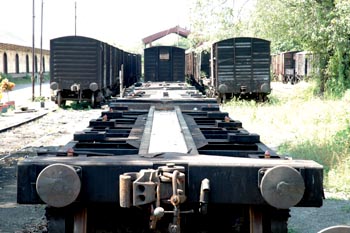|
observer |
|
|
|
|
|
OTHER LINKS |

|

|

|
IngenuityRequired in overdoses Remember the railway tracks at Auschwitz Birkenau? You would if you watched Schindler's List. If you have not seen the movie, well...the same kind of spine chilling eeriness (greatly toned down of course) could be experienced if you visited the abandoned railway tracks in Maradana, on a weekday morning.
From Agatha Christie's Murder on the Orient Express to Dr. Ranaga Wickramasinghe's Satha Dahaya trains and railway tracks have often been associated with gloomy and foreboding events. Add to this a sense of desolation and the picture is complete. But, hopefully not for long. Though we are often resistant to changes or persistently stubborn when it comes to applying new solutions to current conditions, with the increase in traffic congestion on the roads the bulk transportation of containers over long distance by rail is surely the right answer - both economically and environmentally, which means sites like the above will soon be non-existent. This is specially so, because under the right circumstances, freight transport by rail provides the best 'capacity' in the transport industry due to the fact that "capacity" which is usually defined in terms of a level of service, such as how many trucks or trains can be handled efficiently and effectively by a facility in a given amount of time is congested on the roads as a result of the number of heavy vehicles which has risen drastically in recent times, so much so that previous speeds are no longer sustainable. Capacity, however, can be constrained by a shortage of any critical input-infrastructure (for example, tracks or switching systems), equipment (locomotives and other rail cars), or labour. This means, according to the officers of the Sri Lanka Railways, at present the Department is not in a position to mitigate the effects of a surge in demand for freight transportation. Providing the number of cars on-line, system train speed and yard dwell time, on-time performance, train- and engine-crew utilization, locomotive utilization, and infrastructure and capacity improvements that would be required to operate a successful freight transportation system is seen as a Herculean task which would not be achieved during this century. Steps taken in this direction till now have not been successful. The wagons purchased from Egypt in 1990 are kept idling due to the lack of locomotives, as, to quote K. A. Pemasiri, General Manager, Sri Lanka Railways 'Non-availability of 'motive power' has greatly hampered freight transportation." Another set back is the necessity of having different types of freight trains, for carrying different kinds of freight, with many different types of wagons. The type which would most suit today's needs is container trains, where containers can be lifted on and off the train by cranes and loaded off or onto trucks or ships. But what the Department possesses at the moment are the traditional boxcar type trains, with which the cargo has to be loaded or unloaded manually. "This requires double-handling" explains G. R. P. Chandrathilake, Additional General Manager - Operations. Admitting that one main disadvantage of rail freight is its lack of flexibility but believing that improved distribution routes using rail containers will have environmental benefits as it would reduce CO2 emissions to about one-seventh the amount generated by conventional transportation Chandrathilake says 'railway is the best way' and explains that at the moment containers are being transported to Colombo on the Colombo Bandarawela line and the Colombo Trincomalee line. Talking about the abandoned wagons P. P. Wijesekara, Additional General Manager - Technical says that in a new proposal presented to the Ministry of Transport, the Department of Railways intends to utilize the steel taken from the wagons to construct overhead bridges at level crossings. The rest will, as usual be sold as scrap. Needless to say, only railways that are modern and efficient will have a promising future in our transport system. Being modern means running on time, offering reasonably priced fares and attractive services, in other words meeting customer requirements. But it also means being able to meet the challenges of the future. Developing freight transport to make the Department of Railways economically efficient should therefore be one of the logical consequences of any future reforms. With such a policy of growth and consolidation, the railways can surely get back on the right track. Let the railway be the best way. |











